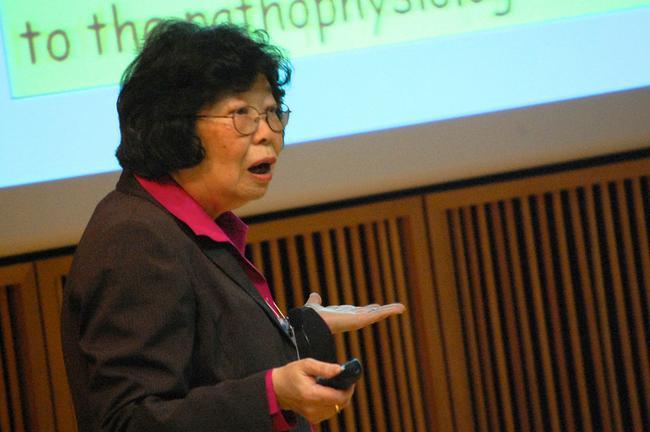The School of Medicine is hosting the Translational Neuroscience Symposium at the Christopher S. Bond Life Science Center from Feb. 27 to March 1.
Leading scientists in neuroscience from all over the world, including Nobel Laureate Roger Tsien, gathered Saturday at MU to share ideas and recent findings in neuroscience.
“At MU, we place a higher priority on translational research,” Provost Brian Foster said during the welcoming remarks. “An important source of support for this critical commitment is University of Missouri’s campus wide effort that we call the Mizzou Advantage, and the key part of the Mizzou Advantage is an initiative we call One Health, One Medicine.”
Foster said this initiative provides the support for the conference. It focuses on the remarkable life science assets at MU and its collaborative work.
“We are confident that our collaborative efforts are going to bring us closer to finding new methods for treating, managing and preventing diseases,” Foster said.
Foster said MU is one of the few institutions in the nation with schools or colleges in medicine, nursing, heath profession, vet medicine, agriculture, animal science, engineering and comprehensive academic medical center all on the same campus. He said it is quite unusual that they work together.
“Expert neuroscientists will share ideas and strategies for unlocking the mysteries of the brain and mind,” said Douglas Anthony, director of The Center for Translational Neuroscience. “Neurologic disorders and disabilities are among the most serious threats to human health, and we will discuss the most prominent and costly diseases and disorders such as Alzheimer’s disease, Parkinson’s disease and stroke.”
The Center for Translational Neuroscience in the MU School of Medicine opened in 2010 and it reflects the university’s ambition to become a leading institution where clinical care and translational research on neurological disorder closely interact.
“Not only does it showcase MU’s growing expertise surrounding neurologic disorders and disability, it brings us together as an academic community working to improve the health of all Missourians,” Anthony said about the symposium.
Anthony said this symposium is aimed at building networks of scientists working in the area of neuroscience.
“Coming together to share the latest research findings moves us closer to understanding how we can translate our efforts to help people suffering from neurodegenerative problems, and will create new scientific relationships to address these complex questions,” Anthony said. “This symposium helps further develop a network of scientists who work together to fight disease and disability.”
Fourteen lecturers will present their ideas during the symposium, including five MU faculty members.
Grace Sun, chairwoman of the symposium and professor of biochemistry, pathology and anatomical science, gave an update on the progress of MU’s Alzheimer’s Disease Program Project on Monday during the talk titled “Targeting the oxidative pathways in Alzheimer’s disease.”
Gary Weisman, a professor of biochemistry and the director of Graduate Studies in Biochemistry also gave a presentation about “P2Y2 Nucleotide receptors mediate pro-inflammatory and neuroprotective responses.”
Zezong Gu, another MU researcher, and assistant professor of pathology and anatomical science, will give a presentation Tuesday.
Tsien, a 2008 Nobel Laureate in Chemistry, will also speak Tuesday about “Breeding and building molecules to spy on cells and disease processes.”








